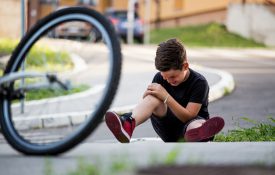-
Teenagers Shape Each Other’s Views on How Risky a Situation Is
Young adolescents’ judgments on how risky a situation might be are most influenced by what other teenagers think, while most other age groups are more influenced by adults’ views, according to new research in Psychological Science, a journal of the Association for Psychological Science. Psychology researchers at University College London (UCL) asked 563 visitors to the London Science Museum to rate the riskiness of everyday situations such as crossing a road on a red light or taking a shortcut through a dark alley. Ratings were given on a continuous scale from low to high risk, and children (aged 8-11) generally rated situations as more risky than all other age groups.
-

Children Less Likely to Come to the Rescue When Others Are Available
Children as young as 5 are less likely to help a person in need when other children are present and available to help.
-
New Research From Clinical Psychological Science
A sample of new research published in Clinical Psychological Science: The Structure of Psychopathology in Adolescence: Replication of a General Psychopathology Factor in the TRAILS Study Odilia M. Laceulle, Wilma A. M. Vollebergh, and Johan Ormel In 2013, Caspi and colleagues found evidence for the existence of a general factor underlying all symptoms of psychopathology. In this study, Laceulle and colleagues attempted to replicate the earlier findings in a large sample of Dutch adolescents who were part of the TRacking Adolescents' Individual Lives Survey.
-

Understanding Loneliness Through Science
Loneliness may be a fundamental part of the human condition, but scientists have only recently begun exploring its causes, consequences, and potential interventions. A special section in Perspectives on Psychological Science, a journal of the
-
Boosting Older Adults’ Vision Through Training
Just a weeks’ worth of training can improve vision in older adults, according to new research in Psychological Science, a journal of the Association for Psychological Science. The findings show that training boosted older adults’ sensitivity to contrast and also their ability to see things clearly at close distances. “Our research indicates that the visual system of older adults maintains a high degree of plasticity and demonstrates that training methods can be used to improve visual function,” explains psychological scientist G.
-
Societally-Engaged Adults See Their Lives as Redemption Stories
Middle-aged Americans who show high levels of societal involvement and mental health are especially likely to construe their lives as stories of personal redemption, according to new research published in Psychological Science, a journal of the Association for Psychological Science. Previous research has shown that adults who are inclined toward generativity — the concern for and commitment to promoting the growth and well-being of future generations — are more likely to engage in a wide range of prosocial behaviors, including positive parenting styles, political participation, and community volunteerism.

